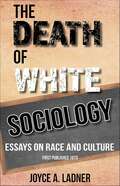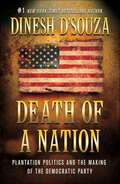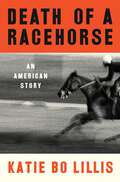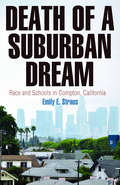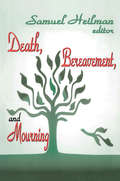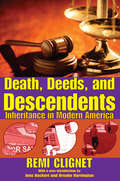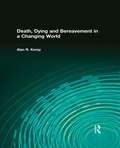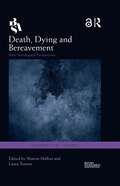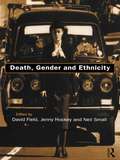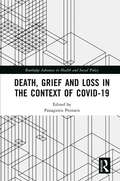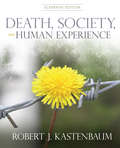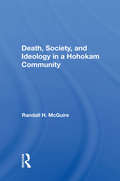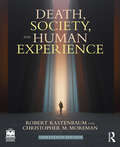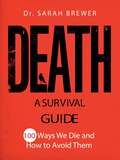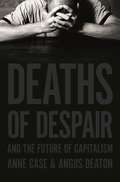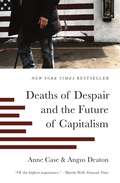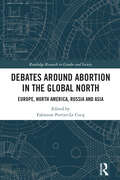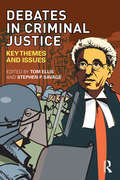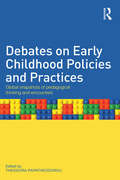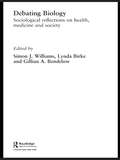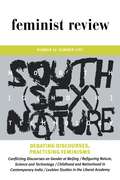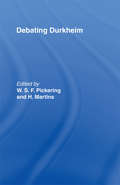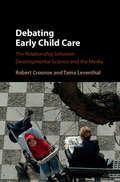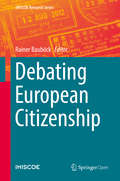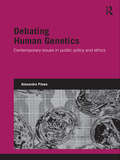- Table View
- List View
Death of White Sociology
by Joyce A. LadnerWhen first published in 1973, this volume issued a powerful call for inclusion of a new perspective in the social sciences. The call demanded acceptance and appreciation of the uniqueness of Black history and society when undertaking the study of Black people.
Death of a Nation: Plantation Politics and the Making of the Democratic Party
by Dinesh D'SouzaThe #1 New York Times–bestselling author tackles the biggest lie of the left—that America is a society based on white supremacy. Now a major motion picture.Who is killing America? Is it really Donald Trump and a GOP filled with white supremacists? In a major new work of historical revisionism, Dinesh D’Souza makes the provocative case that Democrats are the ones killing America by turning it into a massive nanny state modeled on the Southern plantation system.This sweeping alternative history of the Democratic Party goes back to its foundations in the antebellum South. The slaveholding elite devised the plantation as a means of organizing labor and political support. It was a mini welfare state, a cradle to grave system that bred dependency and punished any urge to independence. This model impressed northern Democrats, inspiring the political machines that traded government handouts for votes from ethnic immigrant blocs.Today’s Democrats have expanded to a multiracial plantation of ghettos for blacks, barrios for Latinos, and reservations for Native Americans. Whites are the only holdouts resisting full dependency, and so they are blamed for the bigotry and racial exploitation that is actually perpetrated by the left.Death of a Nation’s bracing alternative vision of American history explains the Democratic Party’s dark past, reinterprets the roles of figures like Van Buren, FDR and LBJ, and exposes the hidden truth that racism comes not from Trump or the conservative right but rather from Democrats and progressives on the left.
Death of a Racehorse: An American Story
by Katie Bo LillisThe inside story of the crisis within the country&’s most classic sport—horseracing—and why money is killing thoroughbreds at the top of their game.Every year, hundreds of horses die on the racetrack. Why? In this deeply reported and propulsive narrative, CNN reporter Katie Bo Lillis shows how two high-profile cases lay bare the ills facing the sport: the abrupt, industry-rocking indictments of top trainers Jason Servis and Jorge Navarro, and the untold story of Bob Baffert, the most successful and recognizable horse trainer in modern history, and the allegations he faced after a string of mysterious horse deaths and the high-profile disqualification of his latest Kentucky Derby winner for a failed drug test. Death of a Racehorse delves deep into the horse racing world, offering intimate access to dozens of top trainers, owners, breeders, veterinarians, lab specialists, and more. The mainstream perception has been that rampant drug use is forcing these horses to run past their natural ability, resulting in heart attacks and broken legs. But this doesn&’t paint the full picture. That picture is driven by class tension between the affluent old stables and an ambitious new guard. This upstairs-downstairs drama shows blue-blooded families on a quest to restore horse racing to the good old days that never existed, versus those like Bob Baffert who are still viewed as outsiders—fantastically successful, but coming from less pedigreed backgrounds and experience. The privileged few, determined to save the sport, seem to hold a powerful suspicion that the sport&’s brash, pioneering working class could not possibly be doing so well on their own. Lillis shows how the breeding industry prioritizes making millions over breeding a sound, durable horse. A disjointed race schedule, created by racetrack operators that are trying to maximize betting opportunities, makes it impossible to manage a horse&’s athletic career safely. In this purely capitalistic industry, the brute force of winning and the money that follows has taken the place of a responsible husbandry of the animal that is its beating heart. Death of a Racehorse is a cutting, on-the-ground investigation into the morally ambiguous behavior at the industry&’s glamorous center, raising nuanced questions about the relationship between animal and human—and offering a hopeful path forward for one of America&’s oldest and most treasured sports.
Death of a Suburban Dream
by Emily E. StrausCompton, California, is often associated in the public mind with urban America's toughest problems, including economic disinvestment, gang violence, and failing public schools. Before it became synonymous with inner-city decay, however, Compton's affordability, proximity to manufacturing jobs, and location ten miles outside downtown Los Angeles made it attractive to aspiring suburbanites seeking single-family homes and quality schools. As Compton faced challenges in the twentieth century, and as the majority population shifted from white to African American and then to Latino, the battle for control over the school district became symbolic of Compton's economic, social, and political crises.Death of a Suburban Dream explores the history of Compton from its founding in the late nineteenth century to the present, taking on three critical issues--the history of race and educational equity, the relationship between schools and place, and the complicated intersection of schooling and municipal economies--as they shaped a Los Angeles suburb experiencing economic and demographic transformation. Emily E. Straus carefully traces the roots of antagonism between two historically disenfranchised populations, blacks and Latinos, as these groups resisted municipal power sharing within a context of scarcity. Using archival research and oral histories, this complex narrative reveals how increasingly racialized poverty and violence made Compton, like other inner-ring suburbs, resemble a troubled urban center. Ultimately, the book argues that Compton's school crisis is not, at heart, a crisis of education; it is a long-term crisis of development.Avoiding simplistic dichotomies between urban and suburban, Death of a Suburban Dream broadens our understanding of the dynamics connecting residents and institutions of the suburbs, as well as the changing ethnic and political landscape in metropolitan America.
Death, Bereavement, and Mourning
by Samuel C. HeilmanAn encounter with the death of another is often an occasion when the bereaved need to be sustained in their loss, relieved of the anxiety that the meeting with death engenders, and comforted in their grief. It is a time when those left behind often seek to redress wrongs in themselves or in the relationships that death has shaken and upset. In both collective and individual responses to the trauma of encountering death, we witness efforts to counter the misfortune and to explain the meaning of the loss, to turn memory into blessing, to reconcile life with death, to regenerate life, and redeem both the bereaved and the dead.Sometimes loss may transform the bereaved in ways that lead to growth and maturity; other times a loss leads to unremitting anger or melancholia. There may be a variety of spiritual expressions that the bereaved experience in their time of loss, but there appears to be some common elements in all of them. Overtime, survivors' feelings are transformed into growing exploration of the spiritual, a profound sense of rebirth, newfound feelings of self-mastery or confidence, and a deeply held conviction that "life goes on."The contributions to this volume are based on a conference held in New York on the first anniversary of September 11, 2001. Contributors include Peter Metcalf, Robert Jay Lifton, Ilana Harlow, Robert A. Neimeyer, Samuel Heilman, and Neil Gillman. This sensitive and heartfelt volume relates specifically to issues of death, bereavement, and mourning in the aftermath of the attack on the World Trade Center, but the applications to other individual and catastrophic events is obvious. The contributions do not simply explore how people deal with bereavement or are psychologically affected by extreme grief: they address how people can try to find meaning in tragedy and loss, and strive to help restore order in the wake of chaos. The multidisciplinary perspectives include those of anthropology, psychology, theology, social work, and art.
Death, Deeds, and Descendents: Inheritance in Modern America (Social Institutions and Social Change Series)
by Jens Beckert Brooke Harrington Remi ClignetClignet's analysis of inheritance patterns in modern America is the first sustained treatment of the subject by a sociologist. Clignet shows that even today inheritance serves to perpetuate both familial wealth and familial relations. He examines what leads decedents to chose particular legal instruments (wills, trusts, insurance policies, gifts inter vivos) and how, in turn, the instrument chosen helps explain the extent and the form of inequalities in bequests, of a result of the gender or matrimonial status of the beneficiaries. The author's major is to identify and explain the most significant sources of variations in the amount and the direction of transfers of wealth after death in the United States. He uses two kinds of primary data: estate tax returns filed by a sample of male and female beneficiaries to estates in 1920 and 1944, representing two successive generations of estate transfers, and publicly recorded legal instruments such as wills and trusts. In addition, Clignet draws widely on secondary sources in the fields of anthropology, economics, and history. His findings reflect substantive and methodological concerns. The analysis underlines the need to rethink the sociology of generational bonds, as it is informed by age and gender. Death, Deeds, and Descendants underscores the variety of forms of inequality that bequests take and highlights the complexity of interrelations between the cultures of the decedents' nationalities and issues like occupation and gender. Inheritance is viewed as a way of illuminating the subtle tensions between continuity and change in American society. This book is an important contribution to the study of the relationship between sociology of the family and sociology of social stratification.
Death, Dying and Bereavement in a Changing World
by Alan R KempThis title takes a comprehensive approach, exploring the physical, social, psychological, and spiritual dimensions of death, dying, and bereavement.Through personal stories from real people, Death, Dying, and Bereavement provides readers with a context for understanding their changing encounters with such difficult concepts.
Death, Dying and Bereavement: New Sociological Perspectives (Sociological Futures)
by Sharon Mallon Laura TowersWhile death, dying and bereavement are universal life events, the social conditions under which death takes place are fundamental in shaping how it is experienced by the individual. Bringing together contributors from around the world, this collection of chapters provides sociological insights into death, dying and bereavement.Drawing upon a range of sociological theorists, including Émile Durkheim, Zygmunt Bauman and C. Wright Mills, the book reviews the historical contribution of sociology to the field of thanatology. In doing so, the book challenges individualistic psychological approaches to death, dying and bereavement and demonstrates how sociological approaches can shape, constrain and empower experiences by imbuing them with both collective and individual meaning. Chapter-length case studies explore a wide range of issues, from digital aspects of remembrance and memorialisation and continued threats to liberties that permit life and death decisions to discussions of the impact and likely legacy of COVID-19 and climate change.This collection will be of interest to students and researchers in the social sciences with an interest in societal attitudes towards death and bereavement.Chapter 6 of this book is freely available as a downloadable Open Access PDF at http://www.taylorfrancis.com under a Creative Commons Attribution (CC-BY) 4.0 license.
Death, Gender and Ethnicity
by Jenny Hockey David Field Neil SmallDeath, Gender and Ethnicity examines the ways in which gender and ethnicity shape the experiences of dying and bereavement, taking as its focus the diversity of ways through which the universal event of death is encountered. It brings together accounts of how these experiences are actually managed with analyses of a range of representations of dying and grieving in order to provide a more theoretical approach to the relationship between death, gender and ethnicity. Though death and dying have been an increasingly important focus for academics and clinicians over the last thirty years, much of this work provides little insight into the impact of gender and ethnicity on the experience. The result is often a universalising representation which fails to take account of the personally unique and culturally specific experiences associated with a death. Drawing on a range of detailed case studies, Death, Gender and Ethnicity develops a more sensitive theoretical approach which will be invaluable reading for students and practitioners in health studies, sociology, social work and medical anthropology.
Death, Grief and Loss in the Context of COVID-19
by Panagiotis PentarisThis book provides detailed analysis of the manifold ways in which COVID-19 has influenced death, dying and bereavement. Through three parts: Reconsidering Death and Grief in Covid-19; Institutional Care and Covid-19; and the Impact of COVID-19 in Context, the book explores COVID-19 as a reminder of our own and our communities’ fragile existence, but also the driving force for discovering new ways of meaning-making, performing rites and rituals, and conceptualising death, grief and life. Contributors include scholars, researchers, policymakers and practitioners, accumulating in a multi-disciplinary, diverse and international set of ideas and perspectives that will help the reader examine closely how Covid-19 has invaded social life and (re)shaped trauma and loss. It will be of interest to all scholars and students of death studies, biomedicine, and end of life care as well as those working in sociology, social work, medicine, social policy, cultural studies, anthropology, psychology, counselling and nursing more broadly.
Death, Society and Human Experience (1-download)
by Robert J. KastenbaumProviding an understanding of the relationship with death, both as an individual and as a member of society. This book is intended to contribute to your understanding of your relationship with death, both as an individual and as a member of society. Kastenbaum shows how individual and societal attitudes influence both how and when we die and how we live and deal with the knowledge of death and loss. Robert Kastenbaum is a renowned scholar who developed one of the world's first death education courses and introduced the first text for this market. This landmark text draws on contributions from the social and behavioral sciences as well as the humanities, such as history, religion, philosophy, literature, and the arts, to provide thorough coverage of understanding death and the dying process. Learning GoalsUpon completing this book, readers should be able to:-Understand the relationship with death, both as an individual and as a member of society-See how social forces and events affect the length of our lives, how we grieve, and how we die-Learn how dying people are perceived and treated in our society and what can be done to provide the best possible care -Master an understanding of continuing developments and challenges to hospice (palliative care).-Understand what is becoming of faith and doubt about an afterlife
Death, Society, And Ideology In A Hohokam Community
by Randall H McguireBased on a study of more than 200 burials at the US site of La Ciudad (725 AD to 1100 AD), this is an exploration of the meaning of burials as statements on the nature of power relations and social structure. Focusing on the inequalities between the distribution of grave goods and other aspects of material culture, the author argues against trying
Death, Society, and Human Experience
by Robert Kastenbaum Christopher M. MoremanThe 13th edition of Death, Society, and Human Experience provides a panoramic overview of the ways that we are touched by death and dying, both as individuals and as members of society. A landmark text in the field, the authors draw on contributions from the social and behavioral sciences as well as the humanities, including perspectives offered through history, philosophy, religion, literature, and the arts, to provide thorough coverage and understanding of topics associated with the end of life and death and dying. By approaching the subject from multiple angles, the authors explain the various ways that individual, cultural, and societal attitudes influence both how and when we die and how we live and deal with the knowledge of death and loss.Originally written by Robert Kastenbaum, a renowned scholar who developed one of the world’s first death education courses, Christopher M. Moreman, who has worked in the field of death studies for two decades, has updated this edition. In addition to infusing his close areas of focus, both in afterlife beliefs and experiences and how these might affect how people live their lives, he’s weaved in new coverage of current affairs, including: The impact of COVID-19 on experiences of death, bereavement, mourning, and more Expanded legalization of physician-assisted dying in the United States and several countries Changes in bereavement rituals and traditions stemming from technology use and social media With additional content and classroom extensions available online, Death, Society, and Human Experience remains a thoughtful, exploratory, and impressively comprehensive overview for undergraduate and graduate courses in death, dying, and bereavement.
Death: A Survival Guide
by Sarah BrewerWe all have a 100% chance of dying--eventually. But what are the world's biggest killers? When are you most at risk? And what can you do to postpone the inevitable for as long as possible? Death: A Survival Guide offers a unique insight into the biggest threats to life and limb in the industrialized world. Sarah Brewer's comprehensive and thorough survey looks at 100 causes of death from the most common such as heart disease, smoking related deaths and domestic accidents to the unusual and downright bizarre lightning strikes and animal attacks. This fascinating--and occasionally sideways--look at death and dying will help you understand the most common causes of death and how each one affects the human body. "At a glance" statistics reveal who dies where, when and how often; lists of warning signs, symptoms and risk factors allow you to determine the chances of it happening to you; and finally case studies on prevention, treatment and cures describe the best steps you can take to avoid meeting your maker in this way.
Deaths of Despair and the Future of Capitalism
by Angus Deaton Anne CaseFrom economist Anne Case and Nobel Prize winner Angus Deaton, a groundbreaking account of how the flaws in capitalism are fatal for America's working classLife expectancy in the United States has recently fallen for three years in a row—a reversal not seen since 1918 or in any other wealthy nation in modern times. In the past two decades, deaths of despair from suicide, drug overdose, and alcoholism have risen dramatically, and now claim hundreds of thousands of American lives each year—and they're still rising. Anne Case and Angus Deaton, known for first sounding the alarm about deaths of despair, explain the overwhelming surge in these deaths and shed light on the social and economic forces that are making life harder for the working class. They demonstrate why, for those who used to prosper in America, capitalism is no longer delivering.Deaths of Despair and the Future of Capitalism paints a troubling portrait of the American dream in decline. For the white working class, today's America has become a land of broken families and few prospects. As the college educated become healthier and wealthier, adults without a degree are literally dying from pain and despair. In this critically important book, Case and Deaton tie the crisis to the weakening position of labor, the growing power of corporations, and, above all, to a rapacious health-care sector that redistributes working-class wages into the pockets of the wealthy. Capitalism, which over two centuries lifted countless people out of poverty, is now destroying the lives of blue-collar America.This book charts a way forward, providing solutions that can rein in capitalism’s excesses and make it work for everyone.
Deaths of Despair and the Future of Capitalism
by Angus Deaton Anne CaseA New York Times BestsellerA Wall Street Journal BestsellerA New York Times Notable Book of 2020A New York Times Book Review Editors’ ChoiceShortlisted for the Financial Times and McKinsey Business Book of the YearA New Statesman Book to ReadFrom economist Anne Case and Nobel Prize winner Angus Deaton, a groundbreaking account of how the flaws in capitalism are fatal for America's working classDeaths of despair from suicide, drug overdose, and alcoholism are rising dramatically in the United States, claiming hundreds of thousands of American lives. Anne Case and Angus Deaton explain the overwhelming surge in these deaths and shed light on the social and economic forces that are making life harder for the working class. As the college educated become healthier and wealthier, adults without a degree are literally dying from pain and despair. Case and Deaton tie the crisis to the weakening position of labor, the growing power of corporations, and a rapacious health-care sector that redistributes working-class wages into the pockets of the wealthy. This critically important book paints a troubling portrait of the American dream in decline, and provides solutions that can rein in capitalism's excesses and make it work for everyone.
Debates Around Abortion in the Global North: Europe, North America, Russia and Asia (Routledge Research in Gender and Society)
by Fabienne Portier-Le CocqBy means of a historical, legal and scientific approach, this book identifies the issues, progress and setbacks in the right for women to access abortion in various countries of the Global North. The book provides insights on the past, present and potential actions and struggles in the future about continuing to have the right to procure an abortion. Rites and rituals in order to better understand the practices of Asian countries, such as China, Japan and Taiwan, permeate discussions and debates. The volume presents the repercussions of the Covid-19 pandemic on access to abortion healthcare services and abortion, and the innovative initiatives and schemes designed and implemented. The latter encourages health professionals and decision-makers to reflect on the ‘good practices’ to retain and develop over the long term. This edited collection is intended for academics and students across the social sciences and healthcare sector, members of the legal profession, healthcare professionals, activists, policy-makers, and any stakeholders working for and caring about women’s reproductive rights and abortion rights.
Debates in Criminal Justice: Key Themes and Issues
by Steve Savage Tom EllisThis innovative new book recognises that, while criminal justice studies is a core component of all criminology/criminal justice undergraduate degrees, it can be a confusing, overwhelming and a relatively dry topic despite its importance. Taking an original approach, this book sets out a series of ten key dilemmas - presented as debates - designed to provide students with a clear framework within which to develop their knowledge and analysis in a way that is both effective and an enjoyable learning experience. It is also designed for use by lecturers, who can structure a core unit of their courses around it. Debates in Criminal Justice provides a new and dynamic framework for learning, making considerable use of the other already available academic key texts, press articles, web sources and more.
Debates on Early Childhood Policies and Practices: Global snapshots of pedagogical thinking and encounters
by Theodora PapatheodorouGlobally, Early Years policies and documents have set out aspirational outcomes and benefits for children, their families and the wider society. These policies have emphasised the place of early childhood provision within the wider global agenda, by tackling inequality and disadvantage early on in children’s lives. However, these strategies have also raised further debates regarding the way they have informed and shaped curricula frameworks and pedagogical approaches. The international team of contributors to this book argue that if these issues are not explicitly acknowledged, understood, critiqued and negotiated, emerging policies and documents may potentially lead to disadvantaging, marginalising and even pathologising certain childhoods. Divided into two parts, the volume demonstrates the dialectic nature of both policy and practice. The chapters in this wide-ranging text: explore and articulate the philosophical premises and values that underpin current early childhood policy, curricula and pedagogies explicitly acknowledge and articulate some of potential conflicts and challenges they present provide examples of divergent and creative pedagogical thinking highlight opportunities for enabling pedagogical cultures and encounters. Debates on Early Childhood Policies and Practices is aimed at a wide readership including academics and researchers in early years education, policy makers, undergraduate and postgraduate students, practitioners and early childhood professionals.
Debating Biology
by Simon J. Williams Gillian A. Bendelow Lynda BirkeRelations between the biological and social sciences have been hotly contested and debated over the years. The uses and abuses of biology, not least to legitimate or naturalize social inequalities and to limit freedoms, have rightly been condemned. All too often, however the style of debate has been reductionist and ultimately unfruitful. As we enter an age in which ultr-Darwinian forms of explanation gather momentum and the bio-tech revolution threatens a 'Brave New World' of possibilities, there is urgent need to re-open the dialogue and rethink these issues in more productive ways. Debating Biology takes a fresh look at the relationship between biology and society as it is played out in the arena of health and medicine. Bringing together contributions from both biologists and sociologists, the book is divided into five themed sections:- Theorising Biology draws on a range of critical perspectives to discuss the case or 'bringing back' the biological into sociology.- Structuring Biology focuses on the interplay between biological and social factors in the 'patterning' of health and illness.- Embodying Biology examines the relationship between the lived body and the biological body- Technologizing Biology takes up the multiple relations between biology, science and technology.- Reclaiming Biology looks at the broader ethical and political agendas.Written in an accessible and engaging style, this timely volume will appeal to a wide audience within and beyond the social sciences, including students, lecturers and researchers in health and related domains.
Debating Discourses, Practising Feminisms: Feminist Review, Issue 56
by The Feminist Review CollectiveDebating Discourses, Practising Feminisms brings together international debates on the discourses and practices of contemporary feminisms. Discussions range across conflicting analyses of gender and politics at the UN conference at Beijing; nationalism and religious conflict in contemporary India; Re-imaginings of science and subjectivity in anglophone science fiction; and the political and intellectual complexities at stake in the project of lesbian studies in the UK. Contributions from these diverse fields come together to give critical attention to the complex terrain of Feminism in the 1990s.
Debating Durkheim: A Century Of Research And Debate (Routledge Studies In Social And Political Thought Ser. #Vol. 28)
by W. S. F. Pickering H. MartinsFirst published in 1994. Routledge is an imprint of Taylor & Francis, an informa company.
Debating Early Child Care
by Robert Crosnoe Tama LeventhalThroughout distressing cultural battles and disputes over child care, each side claims to have the best interests of children at heart. While developmental scientists have concrete evidence for this debate, their message is often lost or muddied by the media. To demonstrate why this problem matters, this book examines the extensive media coverage of the NICHD Study of Early Child Care and Youth Development - a long-running government-funded study that provides the most comprehensive look at the effects of early child care on American children. Analyses of newspaper articles and interviews with scientists and journalists reveal what happens to science in the public sphere and how children's issues can be used to question parents' choices. By shining light on these issues, the authors bring clarity to the enduring child care wars while providing recommendations for how scientists and the media can talk to - rather than past - each other.
Debating European Citizenship (IMISCOE Research Series)
by Rainer BauböckThis open access book raises crucial questions about the citizenship of the European Union. Is it a new citizenship beyond the nation-state although it is derived from Member State nationality? Who should get it? What rights and duties does it entail? Should EU citizens living in other Member States be able to vote there in national elections? If there are tensions between free movement and social rights, which should take priority? And should the European Court of Justice determine what European citizenship is about or the legislative institutions of the EU or national parliaments? This book collects a wide range of answers to these questions from legal scholars, political scientists, and political practitioners. It is structured as a series of three conversations in which authors respond to each other. This exchange of arguments provides unique depth to the debate.
Debating Human Genetics: Contemporary Issues in Public Policy and Ethics (Genetics and Society)
by Alexandra PlowsDebating Human Genetics is based on ethnographic research focusing primarily on the UK publics who are debating and engaging with human genetics, and related bio and techno-science. Drawing on recent interviews and data, collated in a range of public settings, it provides a unique overview of multiple publics as they ‘frame’ the stake of the debates in this emerging, complex and controversial arena. The book outlines key sites and applications of human genetics that have sparked public interest, such as biobanks, stem cells, genetic screening and genomics. It also addresses the ‘scientific contoversies’ that have made considerable impact in the public sphere – the UK police DNA database, gene patenting, ‘saviour siblings’, and human cloning. By grounding the concepts and issues of human genetics in the real life narratives and actions of patient groups, genetic watchdogs, scientists, policy makers, and many other public groups, the book exemplifies how human genetics is a site where public knowledge and value claims converge and collide, and identifies the emergence of ‘hybrid publics’ who are engaging with this hybrid science.
